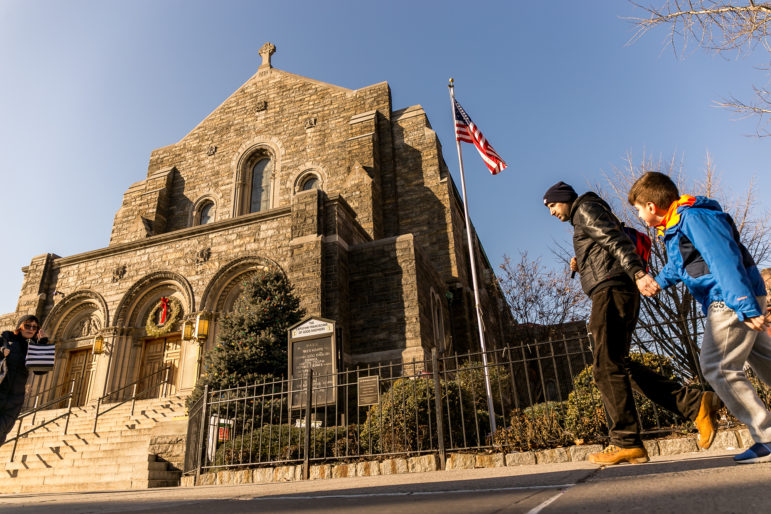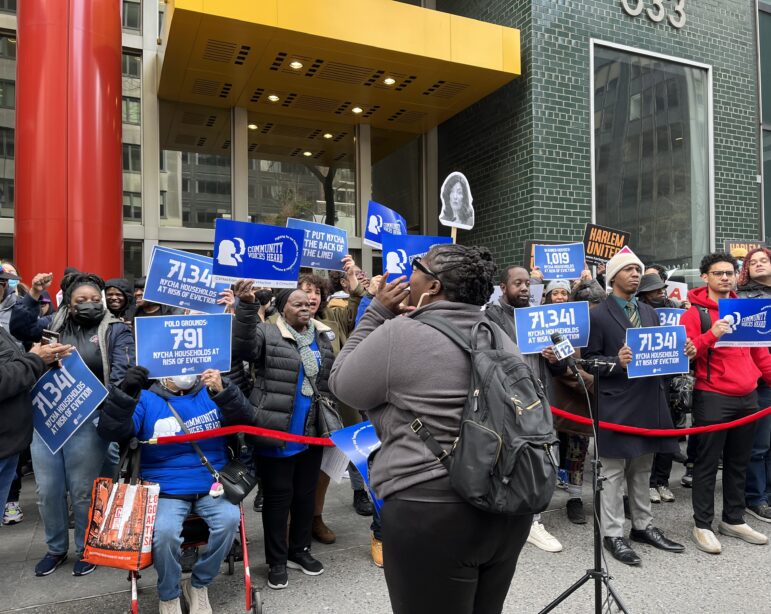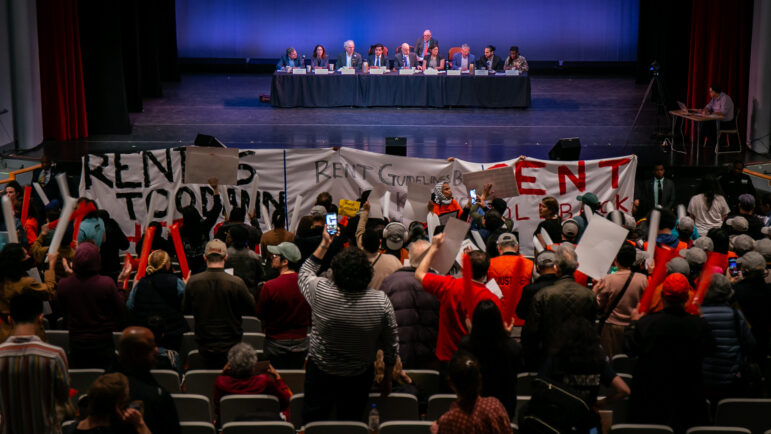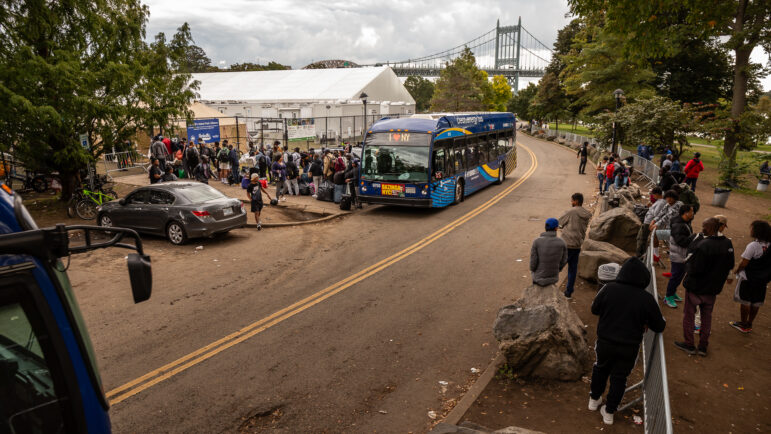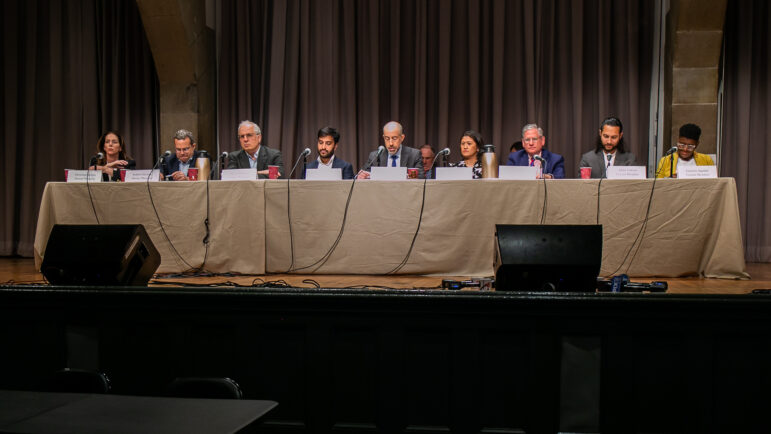“As a city, do we want to make people suffer through three months of homelessness before we give them a chance to regain stability through housing?”
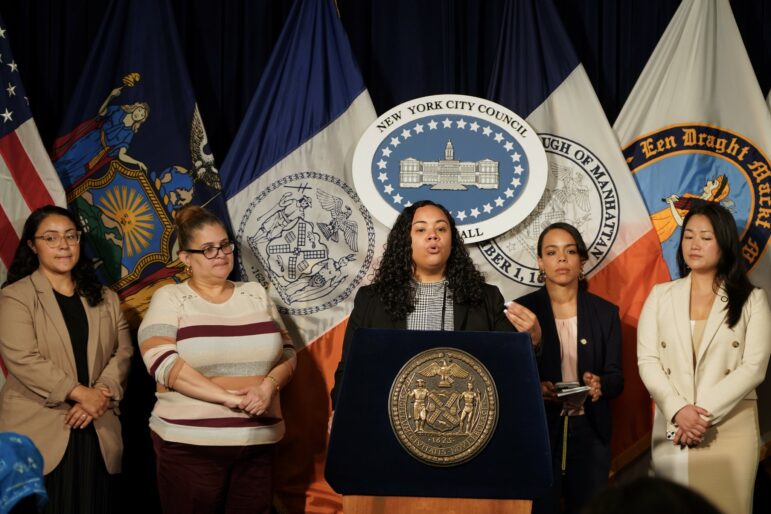
Gerardo Romo / NYC Council Media Unit
City Council members at a press conference on May 24, speaking in support of legislation to expand CityFHEPS.New York City’s staggering homelessness crisis has put the Adams administration to the test. Just last month, the NYC Chief Housing Officer resigned. In an eyebrow-raising move, Mayor Eric Adams is attempting to suspend New York City’s historic right-to-shelter. And city data shows that homelessness encampment sweeps, a pillar of the mayor’s approach to street homelessness, have utterly failed to move New Yorkers off the streets.
Despite this bleak landscape, there is hope. Last month, the City Council passed four bills to expand access to the city’s rental assistance voucher, known as CityFHEPS (Family Homelessness and Eviction Prevention Supplement). The cumbersome eligibility requirements for CityFHEPS meant that many New Yorkers fell through the cracks and were unable to access rental assistance when they needed it most.
The changes included in the recently passed bills will allow CityFHEPS to be used as a preventive tool to keep people at risk of eviction in their homes. This will prevent the unnecessary and traumatic experience of eviction and entering shelter, preserve affordability of existing low-income housing, and save the city money in shelter costs.
The new bills will also ensure that New Yorkers in homeless shelters are more rapidly housed by getting rid of the cruel 90-day rule, an arbitrary regulation that requires people be homeless for a minimum of 90 days before they are eligible for the CityFHEPS voucher. As a city, do we want to make people suffer through three months of homelessness before we give them a chance to regain stability through housing?
With the ongoing housing affordability crisis and city and state executives using migrants as political pawns, it is common sense that the city should marshal its resources and do everything in its power to help people move out of the shelter system as soon as possible to help ease the current strain.
In tandem with the expanded access to CityFHEPS, the city should also ensure that the necessary resources are in place for New Yorkers to fully use their vouchers. One of the key barriers to voucher utilization is the fact that many brokers and landlords deny prospective tenants who have vouchers, an illegal practice known as a source of income (SOI) discrimination. Unlock NYC and Neighbors Together have documented over 1,500 incidents of SOI discrimination since 2018.
Until now, the agency responsible for enforcing the law and cracking down on discriminatory landlords—NYC Commission on Human Rights (CCHR) and its specialized SOI Unit—has been severely underfunded and short-staffed. Fortunately, the FY2024 Executive Budget allocates a new $1.3 million for CCHR’s SOI Unit to hire an additional 17 attorneys and specialists who will focus exclusively on SOI discrimination complaints.
This investment is a big step in the right direction and demonstrates a concrete and timely response to our homelessness crisis. We applaud the City Council and the mayor for listening to impacted advocates and allocating much needed resources to combat discrimination.
To truly meet the need given the expansion of CityFHEPS, the city should increase this funding to $2 million, and have at least 20 attorneys available to New Yorkers facing SOI discrimination. The expanded capacity would enable CCHR’s SOI Unit to reduce intake delays, secure more apartments for voucher holders through lawsuits and settlements, overturn illegal denials through Pre-Complaint Interventions (PCIs), and ultimately house more homeless New Yorkers.
It is absolutely critical to keep the new funding for the SOI Unit in the final budget, and increasing it to $2 million would be nothing short of transformative.
The city must work to fill these new positions rapidly and to attract and retain high quality housing attorneys with salaries that are on par with those of nonprofit and private legal services. Underpaying city workers not only impacts their livelihoods—it is also detrimental to the vulnerable populations they serve, particularly those experiencing housing insecurity.
As such, we urge the mayor and the City Council to enact competitive salaries, implement flexible remote work policies, and streamline the hiring process. Fair compensation for these workers is not only a matter of economic justice but also a way to fortify the services that support the most vulnerable members of our society.
To address the homelessness crisis in New York City, a multifaceted approach is required, and the passage of the four new CityFHEPS bills and increased CCHR funding represent an encouraging step in the right direction.
The expansion of access to CityFHEPS will provide crucial support to families and individuals experiencing housing insecurity. By increasing CCHR’s budget, the city will ensure that voucher holders can use their vouchers to access safe, affordable housing.
Together, these initiatives can make significant strides in our efforts to end homelessness and create a more equitable New York City.
Jessica Valencia is the head of communications at Unlock NYC. Manon Vergerio is the co-founder and head of data and advocacy at Unlock NYC. Amy Blumsack is the director of organizing and policy for Neighbors Together.


